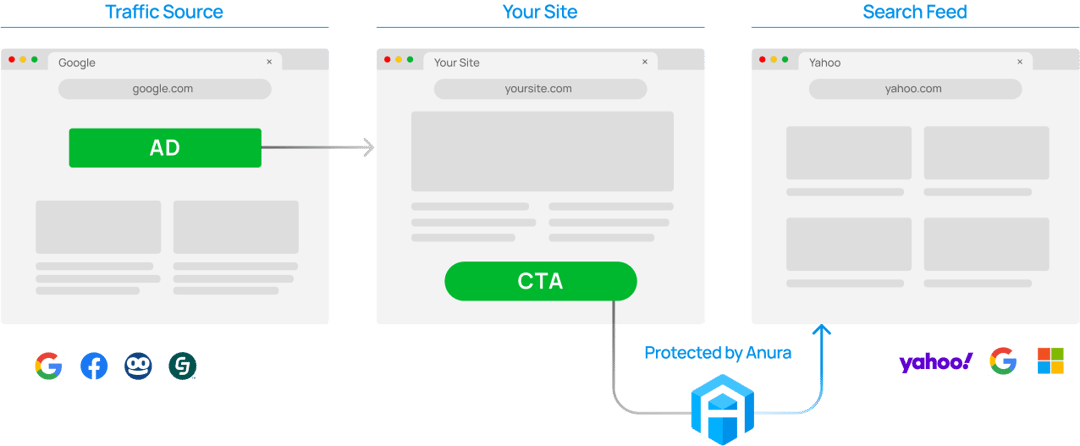3 min read
What Is Ad Injection and How Does It Work?
TL;DR: Ad injection is a sophisticated form of ad fraud that inserts unauthorized ads into legitimate websites,...
Keep your revenue stream safe by protecting your feed from the effects of search arbitrage.

Search and content arbitrage is a digital marketing strategy where businesses capitalize on the difference in cost between acquiring traffic through search engines or other sources and the revenue generated from displaying ads to that traffic via ad impressions and clicks.
Businesses may see arbitrage as profitable, but this strategy is also inherently risky.
Engaging in advertising arbitrage without the proper safeguards can lead to several issues:
Clawbacks from Vendors
Account Suspension, Shut off or Loss
Decreased Revenue Per Click (RPC)
Reduced Margins from Inefficient Ad Spend
Client Complaints, Damaging your Brand's Reputation
Skewed Analytics
Anura Acts like a Visitor Firewall

A "visitor firewall" is critical in digital marketing for screening incoming traffic. It distinguishes between legitimate visitors and malicious ones, ensuring your digital assets are protected from unauthorized access. This not only enhances security but also improves the user experience for genuine visitors, maintaining the integrity of your marketing efforts.
By ensuring that only legitimate traffic engages with your ads, Anura significantly reduces the risk of disputed transactions.
If a business’s methods of search arbitrage are deemed deceptive or manipulative, it could face penalties from ad networks. Anura helps you maintain your accounts in good standing with ad networks by eliminating fraudulent traffic.
Search arbitrage relies on directing traffic from low-cost keywords to high-revenue pages. Anura's advanced filtering mechanisms enhance the quality of your incoming traffic, ensuring better engagement and conversion rates.
Search engines frequently update their policies and algorithms. Anura helps you stay compliant with your ad network's policies, avoiding penalties or suspensions.

How it Works

As defined in the Ad Fraud Glossary: Search Arbitrage Fraud is when fraudsters exploit search engine ads by bidding on low-cost keywords and redirecting traffic to misleading or low-value landing pages. They profit by generating clicks on ads from users who are misled, causing advertisers to pay for fraudulent traffic. This manipulates the system to create an artificial demand for clicks.
As defined in the Ad Fraud Glossary: An Advertising Bot is an automated program designed to interact with online ads, often by clicking on them or mimicking human behavior to generate fraudulent activity. These bots can drive up ad costs, waste marketing budgets, and skew performance metrics, making it harder for advertisers to measure true engagement and ROI. Detecting and blocking advertising bots is crucial for maintaining the integrity of online ad campaigns.
Ad arbitrage is when someone buys online ads at a low price and then sells the traffic those ads generate for a higher price. They make money by getting more from the traffic than they spend on the ads.
As defined in our Ad Fraud Glossary: Content Arbitrage is a strategy used in the affiliate marketing space, where marketers purchase traffic at a lower cost and monetize it through display, native, or contextual advertising at a higher rate. The difference between the cost of acquiring traffic and the revenue generated from ads is the profit.
Affiliate arbitrage involves using paid advertising to promote affiliate products. The goal is to spend less on ads than the commission earned from affiliate sales, and in turn, make a profit.
Search arbitrage can happen on any platform. Google search arbitrage, specifically, operates by exploiting the cost-per-click pricing model. This is where the arbitrageur aims to earn more from ads on their landing pages than they spend on Google Ads. It's risky due to potential changes in ad policies and cost fluctuations but can be profitable with precise targeting and optimization.
Businesses may use techniques like keyword research to find cost-effective yet high-value keywords. They might also use programmatic platforms for buying ad space while continuously optimizing ad performance and targeting to be profitable.
Digital arbitrage involves exploiting price differences for goods or services in different markets, often in the digital space. It typically refers to purchasing digital products, services, or traffic at lower prices and selling or monetizing them at a higher rate. In digital marketing, this can mean acquiring traffic cheaply through one channel and monetizing it via higher-paying ads or affiliate commissions, leveraging the margin for profit.
Search feed arbitrage is a tactic where marketers buy traffic from one search engine or platform at a low cost and redirect it to higher-paying search feeds or monetized search result pages. The aim is to profit from the margin between the traffic acquisition cost and the revenue generated from displaying ads on the landing page. This method requires optimization to ensure the traffic is relevant and aligns with ad network policies to avoid penalties.
Traffic arbitrage refers to the practice of purchasing web traffic at a low cost and then redirecting it to a monetized platform or ad network that generates higher revenue. The aim is to profit from the difference between the cost of acquiring the traffic and the earnings from ads or affiliate offers. It requires managing traffic quality to ensure profitability without violating platform rules or risking penalties.
Feb 25, 2026
TL;DR: Ad injection is a sophisticated form of ad fraud that inserts unauthorized ads into legitimate websites,...
Feb 20, 2026
TL;DR: More than half of all internet traffic in 2026 comes from bots—many of which are harmful to your brand and...
Feb 18, 2026
TL;DR:Ad fraud quietly drains marketing budgets while corrupting the data businesses rely on to grow. Beyond wasted...
Feb 12, 2026
TL;DR: Affiliate marketing thrives when you choose the right niche. Health, finance, SaaS, lifestyle, education, and...
Feb 12, 2026
TL;DR: Engagement is crucial for performance marketers, but Instagram bots inflate metrics, waste ad spend, and damage...
Feb 11, 2026
TL;DR:
